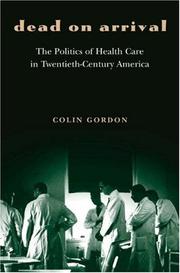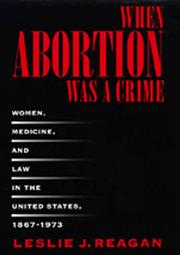| Listing 1 - 4 of 4 |
Sort by
|

ISBN: 1282087223 128293533X 9786612935336 9786612087226 1400825679 0691058067 0691119511 9781400825677 9780691058061 Year: 2003
Abstract | Keywords | Export | Availability | Bookmark
 Loading...
Loading...Choose an application
- Reference Manager
- EndNote
- RefWorks (Direct export to RefWorks)
Why, alone among industrial democracies, does the United States not have national health insurance? While many books have addressed this question, Dead on Arrival is the first to do so based on original archival research for the full sweep of the twentieth century. Drawing on a wide range of political, reform, business, and labor records, Colin Gordon traces a complex and interwoven story of political failure and private response. He examines, in turn, the emergence of private, work-based benefits; the uniquely American pursuit of "e;social insurance"e;; the influence of race and gender on the health care debate; and the ongoing confrontation between reformers and powerful economic and health interests. Dead on Arrival stands alone in accounting for the failure of national or universal health policy from the early twentieth century to the present. As importantly, it also suggests how various interests (doctors, hospitals, patients, workers, employers, labor unions, medical reformers, and political parties) confronted the question of health care--as a private responsibility, as a job-based benefit, as a political obligation, and as a fundamental right. Using health care as a window onto the logic of American politics and American social provision, Gordon both deepens and informs the contemporary debate. Fluidly written and deftly argued, Dead on Arrival is thus not only a compelling history of the health care quandary but a fascinating exploration of the country's political economy and political culture through "e;the American century,"e; of the role of private interests and private benefits in the shaping of social policy, and, ultimately, of the ways the American welfare state empowers but also imprisons its citizens.
Medical policy --- Medical care --- Political aspects --- ziektekostenverzekering (sociale zekerheid, mutualiteit, ziekenfonds, zorgverzekeraar) --- assurance maladie (sécurité sociale, mutualité) --- geschiedenis (historische aspecten) --- gezondheidszorgbeleid (gezondheidszorghervorming, gezondheidszorgsysteem) --- gezondheidszorg --- Verenigde Staten --- histoire (aspects historiques) --- politique des soins de santé (réforme des soins de santé, système des soins de santé) --- soins de santé --- Etats Unis --- Medical policy - United States. --- Medical care - Political aspects - United States.

ISBN: 0203360656 1280054328 0415178576 0415178584 1134683529 9780203360651 9780415178570 9780415178587 0203373219 9780203373217 9786610054329 6610054320 9781280054327 9781134683529 9781134683475 9781134683512 1134683510 Year: 2001 Publisher: Hove Brunner-Routledge
Abstract | Keywords | Export | Availability | Bookmark
 Loading...
Loading...Choose an application
- Reference Manager
- EndNote
- RefWorks (Direct export to RefWorks)
The Nature of Grief is a provocative new study on the evolution of grief. Most literature on the topic regards grief either as a psychiatric disorder or illness to be cured. In contrast to this, John Archer shows that grief is a natural reaction to losses of many sorts, even to the death of a pet, and he proves this by bringing together material from evolutionary psychology, ethology and experimental psychology. This innovative new work will be required reading for developmental and clinical psychologists and all those in the caring professions.
Grief. --- Bereavement --- Death --- Loss (Psychology) --- Psychological aspects. --- Mourning --- Sorrow --- Psychology --- rouw (verlies) --- culturele aspecten (kunst) --- deuil (perte) --- aspects culturels (art) --- Loss (Psychology). --- Primary groups --- Developmental psychology --- Animal ethology and ecology. Sociobiology --- Emotions --- Psychological aspects --- Grief --- geschiedenis (historische aspecten) --- psychologie (psychologische aspecten) --- histoire (aspects historiques) --- psychologie (aspects psychologiques)
Book
ISBN: 9789400407930 9400407939 9789400404908 Year: 2017 Publisher: Amsterdam Uitgeverij Thomas Rap
Abstract | Keywords | Export | Availability | Bookmark
 Loading...
Loading...Choose an application
- Reference Manager
- EndNote
- RefWorks (Direct export to RefWorks)
Honderdduizend jaar geleden waren er wel zes verschillende menssoorten. Nu is er maar één soort over, en dat zijn wij. Homo sapiens. Hoe komt het dat alleen wij zijn overgebleven? Hoe kwamen onze voorvaderen op het idee om steden en zelfs koninkrijken te stichten? Waarom gingen we in goden geloven, maar ook in natiestaten, en in bedrijven. Waarom vertrouwen we op geld, boeken en wetten? En hoe zal onze wereld er in de toekomst uitzien?In Sapiens neemt Yuval Noah Harari ons mee op een fascinerende reis door de geschiedenis van de mensheid. Wie zijn we? Waar komen we vandaan? En hoe zijn we geworden wie we nu zijn? In zijn aanstekelijke relaas laat Harari ons kennismaken met een raadselachtig fenomeen: de mens.
Philosophy of science --- Biological anthropology. Palaeoanthropology --- Philosophy and psychology of culture --- History of civilization --- BPB9999 --- geschiedenis (historische aspecten) --- filosofie --- 903 --- beschavingsleer --- geschiedenis --- evolutieleer --- histoire (aspects historiques) --- algemene geschiedenis --- Geschiedenis --- Evolutieleer --- Mensen --- BPB1810 --- Histoire universelle --- Wereldgeschiedenis --- Cultuurfilosofie. Cultuurpsychologie --- Wetenschapsfilosofie --- Biologische antropologie. Paleoantropologie --- Cultuurgeschiedenis --- cultuurgeschiedenis --- Weltgeschichte --- world history --- dejiny sveta --- maailmanhistoria --- världshistoria --- verdenshistorie --- storia universale --- svjetska povijest --- storja tad-dinja --- istorie universală --- história universal --- historia świata --- световна история --- historia universal --- egyetemes történelem --- maailma ajalugu --- histori e botës --- svetovna zgodovina --- pasaules vēsture --- wereldgeschiedenis --- светска историја --- pasaulio istorija --- světová historie --- παγκόσμια ιστορία --- историја на светот --- dějiny světa --- historie světa --- světové dějiny --- világtörténelem --- povijest svijeta --- Mens --- Geneeskunde --- Techniek (wetenschap) --- Atlas --- Museum --- Dier --- stair an domhain --- histoire universelle

ISBN: 0520216571 0520088484 1283382164 0520922069 9786613382160 0585091099 9780520922068 9780585091099 9780520088481 9780520088481 9780520216570 6613382167 9781283382168 Year: 1998 Publisher: Berkeley University of California press
Abstract | Keywords | Export | Availability | Bookmark
 Loading...
Loading...Choose an application
- Reference Manager
- EndNote
- RefWorks (Direct export to RefWorks)
As we approach the 30th anniversary of Roe v. Wade, it's crucial to look back to the time when abortion was illegal. Leslie Reagan traces the practice and policing of abortion, which although illegal was nonetheless widely available, but always with threats for both doctor and patient. In a time when many young women don't even know that there was a period when abortion was a crime, this work offers chilling and vital lessons of importance to everyone. The linking of the words "abortion" and "crime" emphasizes the difficult and painful history that is the focus of Leslie J. Reagan's important book. Her study is the first to examine the entire period during which abortion was illegal in the United States, beginning in the mid-nineteenth century and ending with Roe v. Wade in 1973. Although illegal, millions of abortions were provided during these years to women of every class, race, and marital status. The experiences and perspectives of these women, as well as their physicians and midwives, are movingly portrayed here. Reagan traces the practice and policing of abortion. While abortions have been typically portrayed as grim "back alley" operations, she finds that abortion providers often practiced openly and safely. Moreover, numerous physicians performed abortions, despite prohibitions by the state and the American Medical Association. Women often found cooperative practioners, but prosecution, public humiliation, loss of privacy, and inferior medical care were a constant threat. Reagan's analysis of previously untapped sources, including inquest records and trial transcripts, shows the fragility of patient rights and raises provocative questions about the relationship between medicine and law. With the right to abortion again under attack in the United States, this book offers vital lessons for every American concerned with health care, civil liberties, and personal and sexual freedom.
Abortion. --- Abortion -- Law and legislation -- United States -- History. --- Abortion -- United States -- History. --- Abortion services. --- Abortion services -- United States -- History. --- Abortion services --- -Reproductive Physiological Phenomena --- Abortion, Criminal --- Mass Media --- Supreme Court Decisions --- Women's Health Services --- Abortion, Therapeutic --- Organizational Policy --- Nurse Midwives --- illegale abortus --- anti-abortus (pro-vita) --- avortement illégal --- pro-vie (anti-avortement) --- Abortion clinics --- Abortion facilities --- Abortion --- Abortion, Induced --- Feticide --- Foeticide --- Induced abortion --- Pregnancy termination --- Termination of pregnancy --- Birth control --- Fetal death --- Obstetrics --- Reproductive rights --- Birth control clinics --- Women's health services --- History. --- Law and legislation --- Surgery --- abortus (vrijwillige zwangerschapsafbreking) --- geschiedenis (historische aspecten) --- recht (wetgeving, rechtspraak, rechtsbeginselen, juridische aspecten, aansprakelijkheid) --- Verenigde Staten --- History --- Law and legislation&delete& --- avortement (interruption volontaire de grossesse, IVG) --- histoire (aspects historiques) --- droit (aspects juridiques, législation, jurisprudence, principes de droit, responsabilité) --- Etats Unis --- Criminologie --- Droit pénal --- Procédure pénale --- Avortement --- Sociologie de la deviance --- Sociologie de la medecine --- 19th century. --- abortion rights. --- abortion. --- american history. --- bodily autonomy. --- childbirth. --- civil liberties. --- court cases. --- crime. --- health care. --- human body. --- illegal abortion. --- law and order. --- legal issues. --- medical care. --- medical issues. --- personal freedom. --- pregnancy. --- privacy. --- prosecution. --- right to choose. --- roe v wade. --- sexual freedom. --- sexuality. --- supreme court cases. --- supreme court. --- transcripts. --- trial. --- true story. --- united states history. --- us history. --- womens issues. --- womens right to choose.
| Listing 1 - 4 of 4 |
Sort by
|

 Search
Search Feedback
Feedback About UniCat
About UniCat  Help
Help News
News